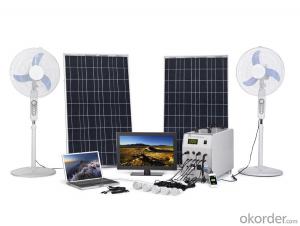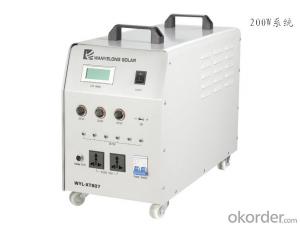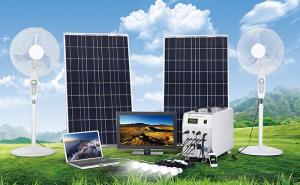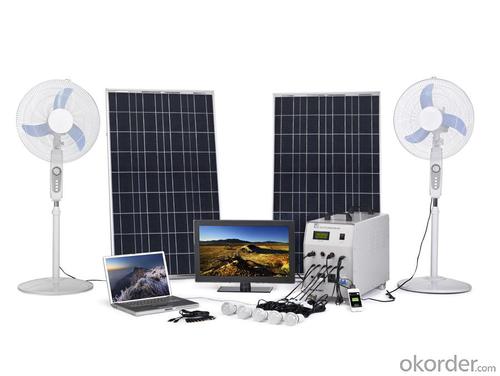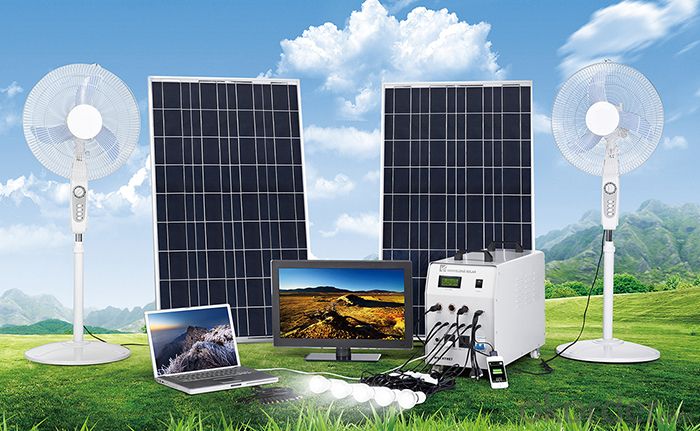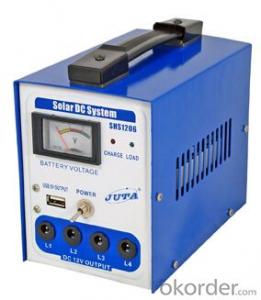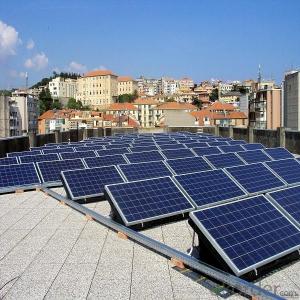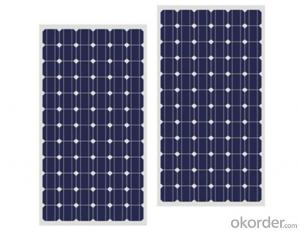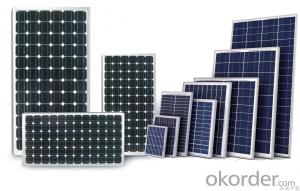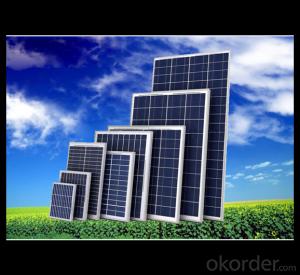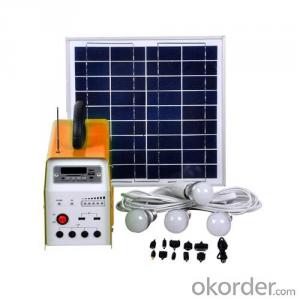Domestic Solar Energy Systems - AC >200W Solar Power System
- Loading Port:
- Guangzhou
- Payment Terms:
- TT OR LC
- Min Order Qty:
- 20 set
- Supply Capability:
- 10000 set/month
OKorder Service Pledge
OKorder Financial Service
You Might Also Like
Light up 4-6 rooms at the same time,with mobile phone charge function,power DC fan,DC TV,Laptop,AC TV,Computer
●Installation,all-in-one DIY Kit;
●5m light cable-with on/off switch;
●Mobile phone charge-for different phones;
●Power Supply-solar or AC adapter;
●Protection-overcharge and over-discharge;
●Pure sine wave inverter built in.
Part | Specification | Qty | |
Solar panel | Poly crystallione type with 10m cable | 100W | ×1 |
Power box | Lead acid rechargeable battery | 55AH/12V | ×1 |
PWM charge controller | 10A/12V | ×1 | |
Pure sine wave inverter | 300W | ×1 | |
AC Output | 220V/110V 50/60Hz | ×1 | |
Cigarette lighter socket output | DC12V | ×2 | |
DC output port | 12V | ×4 | |
USB charge output | 5V | ×1 | |
Others | DC12V LED bulb | 3W | ×4 |
Light holder with 5m cable | On off switch | ×4 | |
USB charge cable | 10 in 1 | ×1 | |
Solar panel mounting bracket | Angle adjustable | ||
DC floor fan (not included) | 15W/12V | ×2 | |
DC TV (not included) | 15inch 30W12V | ×1 | |
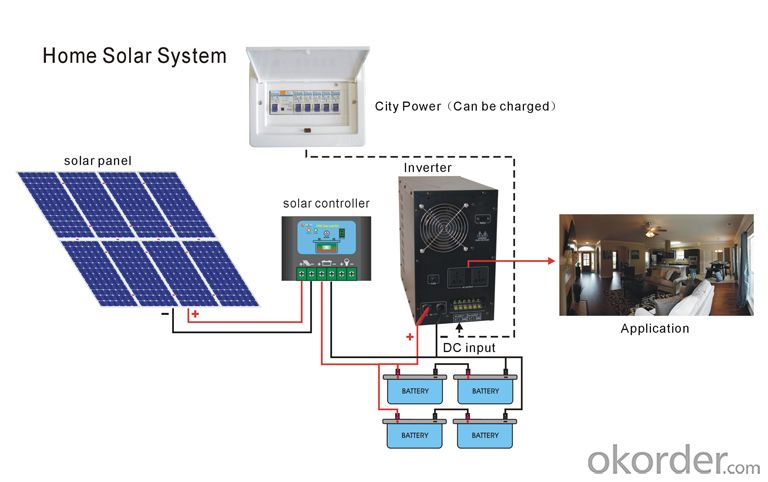
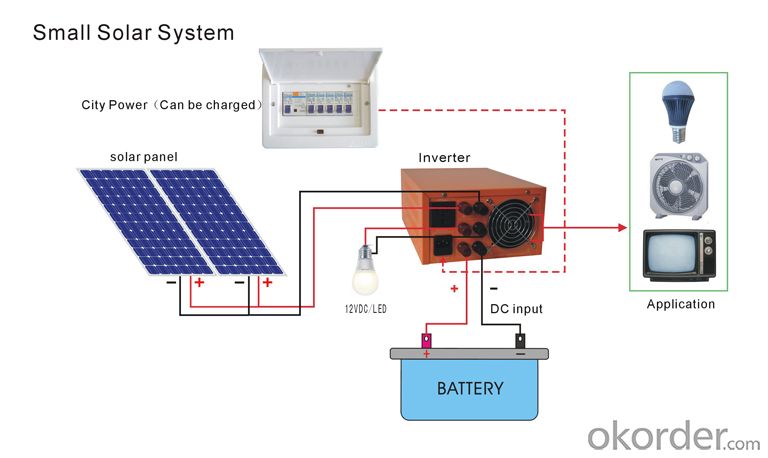
Quantuty
Quality goal:Constant innovation to meet the request of the customers. Protect the environment, provide environmental products to customer.
Quality strategy:
Quality: established high efficiency quality manager system in line with ISO9001 and ISO/TS16949.
Improvement: keeping improvement & quality guarantee.
Efficiency: delivery on time, complete the agreed events with the customers on time.
Service: focus on customers, provide the service and technology support on time.
FAQ
1. How long will my inquiry get response?
Your inquiry related to our products or prices will be replied within 24 hours.
2. Can I get professional service and suggestion?
Well-trained and experienced staffs to answer all your questions in fluent English.
3. Do you accept OEM or customized design?
OEM & ODM, any your customized lightings we can help you to design and put into product.
4. What if I need specific design?
Distributorship are offered for your unique design and some our current models.
- Q: Are there any risks of electrical arcing with solar energy systems?
- Solar energy systems have inherent risks of electrical arcing. This occurs when insulation in electrical components breaks down, causing electricity to flow through non-conductive materials like air. The consequences can be hazardous, including fire and damage to the system. There are several factors that can lead to electrical arcing in solar energy systems. Faulty wiring, loose connections, and damage to solar panels are common culprits. These issues increase the likelihood of electrical arcing, which can result in overheating, component melting, and even fires. To mitigate these risks, it is crucial to have qualified professionals install and maintain the solar energy system in accordance with industry standards and regulations. Regular inspections and maintenance are necessary to identify and address potential issues that could cause electrical arcing. In addition, using high-quality electrical components and implementing proper grounding techniques can help reduce the risk of electrical arcing. Safety measures such as circuit breakers, surge protectors, and arc fault circuit interrupters (AFCIs) can provide further protection against electrical arcing. In conclusion, while solar energy systems have many benefits, it is important to be mindful of the risks of electrical arcing. By ensuring proper installation, maintenance, and adherence to safety guidelines, these risks can be minimized, allowing for the safe and efficient operation of solar energy systems.
- Q: Can solar energy systems be used in areas with limited access to sanitation facilities?
- Yes, solar energy systems can be used in areas with limited access to sanitation facilities. Solar energy systems are independent of sanitation facilities and do not require any connection or reliance on them. They can provide clean and renewable energy for various purposes such as lighting, cooking, heating water, and powering basic appliances, even in areas where sanitation facilities are limited or nonexistent. This makes solar energy an ideal and sustainable solution for improving living conditions and promoting development in such areas.
- Q: Can solar energy systems be used for powering off-grid agricultural processing facilities?
- Yes, solar energy systems can be used for powering off-grid agricultural processing facilities. Solar panels can be installed on the roofs of these facilities or in nearby open spaces to capture sunlight and convert it into electricity. This renewable energy source can provide a consistent and reliable power supply for various agricultural processing operations, such as irrigation systems, grain milling, food drying, and cold storage. Additionally, solar energy systems can be combined with battery storage to ensure uninterrupted power supply even during cloudy days or at night. This can significantly reduce reliance on fossil fuels, lower operating costs, and promote sustainable agricultural practices.
- Q: How does shading affect the performance of solar panels?
- Shading negatively affects the performance of solar panels as it obstructs the amount of sunlight reaching the panels, reducing their efficiency in converting sunlight into electricity. Even a small amount of shading can significantly reduce the overall power output of a solar panel or even render it completely inactive. Therefore, it is crucial to ensure that solar panels are installed in areas with minimal shading to maximize their performance.
- Q: Can solar energy systems be used for powering electric vehicles charging stations?
- Yes, solar energy systems can be used to power electric vehicle charging stations. Solar panels can generate electricity from sunlight, which can then be stored in batteries or directly used to charge electric vehicles. This renewable energy source is environmentally friendly and can help reduce the carbon footprint associated with transportation.
- Q: What is the impact of snow or hail on solar panels?
- Snow or hail can have a negative impact on solar panels as they can obstruct sunlight, reducing the efficiency of the panels. Additionally, the weight of heavy snow or hail can potentially damage the panels or their mounting structure. However, modern solar panels are designed to be durable and typically have a smooth surface, making it easier for snow or hail to slide off. Moreover, many solar panel systems are installed at an angle, which helps facilitate the natural shedding of snow or ice.
- Q: Can solar energy systems be used in cloudy or rainy areas?
- Indeed, solar energy systems retain their usability in areas with cloudy or rainy weather conditions. While it holds true that solar panels function optimally under direct sunlight, they possess the capability to generate electricity even when confronted with cloudy or rainy days. Solar panels are engineered to capture both direct sunlight and diffuse sunlight, which refers to sunlight that permeates through clouds. Despite the reduction in solar panel efficiency during cloudy or rainy conditions, they are still capable of generating a substantial amount of electricity. Furthermore, solar energy systems can be combined with energy storage technologies, such as batteries, to preserve excess energy generated on sunny days for later use during cloudy or rainy periods. Consequently, solar energy systems present a viable and sustainable option for electricity generation in areas with cloudy or rainy climates.
- Q: Can solar energy systems be installed on industrial facilities?
- Yes, solar energy systems can definitely be installed on industrial facilities. In fact, many industries are increasingly adopting solar power as a sustainable and cost-effective energy solution. Installing solar panels on industrial facilities can help reduce electricity costs, lower carbon emissions, and enhance the overall energy efficiency of the operations.
- Q: How do solar energy systems impact the electricity generation mix?
- Solar energy systems have a significant impact on the electricity generation mix by diversifying it and reducing reliance on fossil fuels. The integration of solar power into the mix increases the share of renewable energy sources, which helps reduce greenhouse gas emissions and combat climate change. Additionally, solar energy systems contribute to decentralization and grid resilience, as they can be installed at various scales, promoting a more sustainable and efficient electricity generation landscape.
- Q: Are there any maintenance requirements for solar energy systems?
- Yes, solar energy systems do require some maintenance. Regular cleaning and inspection of the panels is necessary to ensure optimal performance. Additionally, monitoring the system's output and checking for any potential issues is important. However, overall, solar energy systems have minimal maintenance requirements compared to traditional energy sources.
Send your message to us
Domestic Solar Energy Systems - AC >200W Solar Power System
- Loading Port:
- Guangzhou
- Payment Terms:
- TT OR LC
- Min Order Qty:
- 20 set
- Supply Capability:
- 10000 set/month
OKorder Service Pledge
OKorder Financial Service
Similar products
Hot products
Hot Searches
Related keywords
